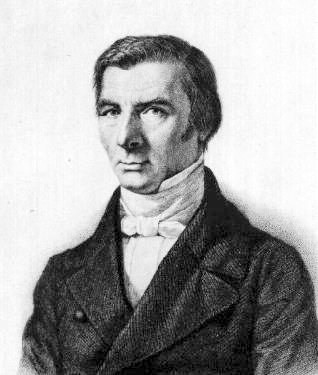
Frédéric Bastiat
1801-1850

Joseph Schumpeter described Bastiat nearly a century after his death as “the most brilliant economic journalist who ever lived.” Orphaned at the age of nine, Bastiat tried his hand at commerce, farming, and insurance sales. In 1825, after he inherited his grandfather’s estate, he quit working, established a discussion group, and read widely in economics.
Bastiat made no original contribution to economics, if we use “contribution” the way most economists use it. That is, we cannot associate one law, theorem, or pathbreaking empirical study with his name. But in a broader sense Bastiat made a big contribution: his fresh and witty expressions of economic truths made them so understandable and compelling that the truths became hard to ignore.
Bastiat was supremely effective at popularizing free-market economics. When he learned of Richard Cobden’s campaign against the British Corn Laws (restrictions on the import of wheat, barley, rye, and oats), Bastiat vowed to become the “French Cobden.” He subsequently published a series of articles attacking protectionism that brought him instant acclaim. In 1846 he established the Association of Free Trade in Paris and his own weekly newspaper, in which he waged a witty assault against socialists and protectionists.
Bastiat’s “A Petition,” usually referred to now as “The Petition of the Candlemakers,” displays his rhetorical skill and rakish tone, as this excerpt illustrates:
We are suffering from the ruinous competition of a foreign rival who apparently works under conditions so far superior to our own for the production of light, that he is flooding the domestic market with it at an incredibly low price…. This rival … is none other than the sun….
We ask you to be so good as to pass a law requiring the closing of all windows, dormers, skylights, inside and outside shutters, curtains, casements, bull’s-eyes, deadlights and blinds; in short, all openings, holes, chinks, and fissures.
This reductio ad absurdum of protectionism was so effective that one of the most successful postwar economics textbooks, Economics by Paul A. Samuelson, quotes the candlemakers’ petition at the head of the chapter on protectionism.
Bastiat also emphasized the unintended consequences of government policy (he called them the “unseen” consequences). Friedrich Hayek credits Bastiat with this important insight: if we judge economic policy solely by its immediate effects, we will miss all of its unintended and longer-run effects and will undermine economic freedom, which delivers benefits that are not part of anyone’s conscious design. Much of Hayek’s work, and some of Milton Friedman’s, was an exploration and elaboration of this insight.
About the Author
David R. Henderson is the editor of The Concise Encyclopedia of Economics. He is also an emeritus professor of economics with the Naval Postgraduate School and a research fellow with the Hoover Institution at Stanford University. He earned his Ph.D. in economics at UCLA.
Selected Works
Related Entries
Related Links
